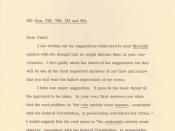Gideon vs. Wainwright
Almost anyone in the Untied States of America can recite their Miranda Rights:
"You have the right to remain silent. Anything you say can and will be used against you. You have the right to talk with a lawyer before being questioned and to have the lawyer present during the questioning. If you cannot afford a lawyer, one will be provided for you before questioning begins."
Although most people connect their Miranda Rights will the famous Miranda vs. Arizona case in 1966, a major part of these basic rights (If you cannot afford a lawyer, one will be provided for you before questioning begins) would exempt if not for the Gideon vs. Wainwright case of 1963. As a prerequisite case to Miranda vs. Arizona, the Gideon vs. Wainwright case became one the most important court cases of the 20th century, as rated by Time magazine.
51 year-old Clarence Gideon was accused and later convicted of breaking and entering into a pool hall.
When Gideon was arrested, he was told that he could not have an attorney considering that the case was not a federal crime. After being sentenced to jail time, Gideon read books on law and how to appeal a court case. Then in 1963 he wrote the Supreme Court, saying that the state of Florida had violated him by not allowing him a free counsel and by following the 14th amendment which states:
"No state shall make or enforce any laws which shall abridge the privileges or immunities of citizens of the United States...."
Because of his letter the Supreme Court allowed the case to be retired and appointed Gideon a lawyer. After this adjustment, Gideon won the case. It was then established that anyone who could not afford a lawyer would be appointed...


